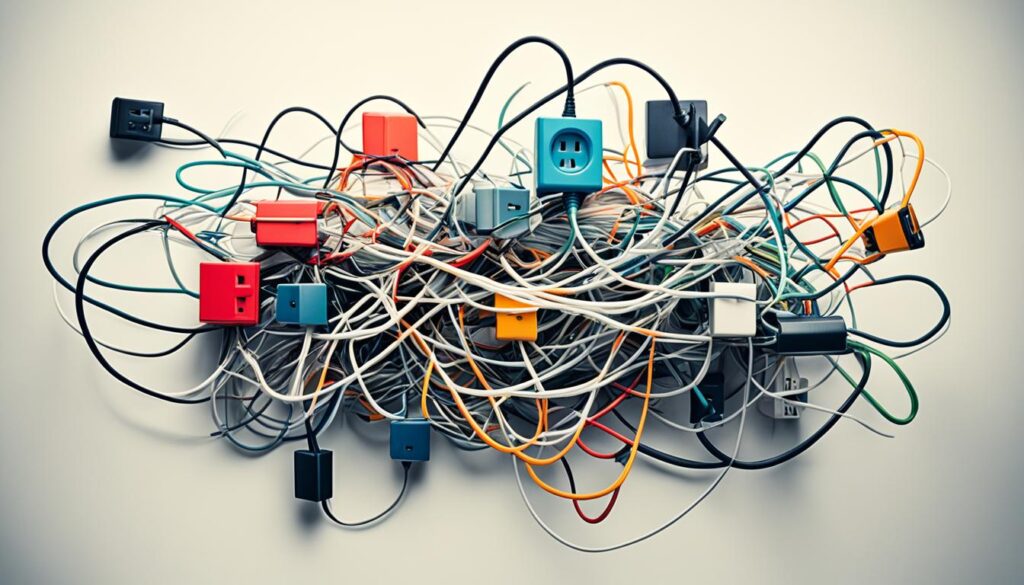Procrastination Is Not Laziness: Understanding Why
Did you know August 10th is National Lazy Day? It’s a day to enjoy being a bit lazy. But, procrastination isn’t really about being lazy. It’s a complex issue that’s more than just lacking willpower or motivation.
The word “procrastination” comes from Latin, meaning “to put off until tomorrow”. It also comes from the Greek word “akrasia,” meaning “doing something against our better judgment.” Dr. Piers Steel, a motivational psychology professor, says procrastination is a kind of self-harm.
Laziness means not wanting to work or be active. But procrastination is different. It’s about avoiding a task even knowing it has bad consequences. Being lazy a lot might show you’re dealing with health problems or burnout.
Key Takeaways
- Procrastination is not the same as laziness, but rather a complex issue involving emotion regulation and self-harm.
- Procrastination is a common behavior experienced by most people, with varying degrees of severity.
- Laziness implies a lack of willingness to put in effort, while procrastination involves actively avoiding a task despite knowing the consequences.
- Ongoing laziness may be a sign of a deeper physical or mental health issue, rather than just a character flaw.
- Understanding the root causes of procrastination, such as fear, perfectionism, and emotional regulation, is key to overcoming it.
What is Procrastination?
Procrastination means putting off tasks or decisions even when it has bad effects. It comes from the Latin “procrastinare,” meaning “to put off until tomorrow,” and the Greek “akrasia,” meaning “doing something against our better judgment.” Dr. Piers Steel, a motivational psychology professor, says it’s a way of harming oneself.
About 20% of adults and 50% of college students often put things off. This behavior is linked to poor grades, job and money issues, and bad mental and physical health. But, it’s not the same as being lazy; you can delay tasks without being lazy, and be lazy without always putting things off.
Putting things off often leads to bad results and is seen as a bad habit. Being lazy is linked to not being diligent and can be a long-term trait or a short-term feeling. It can be hard to tell the difference between being lazy and not motivated or in control of oneself.
Studies show that therapy and mindfulness can help fight procrastination. Breaking tasks into smaller parts can also help change how you think and fight procrastination. It’s important to understand procrastination to find ways to beat it.
Procrastination Is Not Laziness
Many think that procrastination and laziness are the same thing, but they’re not. Procrastination is more than just not wanting to do something. It’s a complex behavior caused by many things like feeling not good enough, not valuing tasks, trouble controlling impulses, and no deadlines.
Unlike being lazy, which means not wanting to work at all, procrastination is about avoiding tasks even knowing they’re bad. Things like wanting to be perfect, not liking tasks, getting distracted, and no deadlines can lead to it. It’s like an addiction, seeking quick relief, losing control, craving distractions, and doing things compulsively.
Willpower is not enough to change behavior; it’s just one part of it. To fight procrastination, focus on making progress, know why you’re doing tasks, use less willpower, and set easy goals. Procrastination isn’t about being lazy; it’s about not having the right motivation.
It’s key to understand the difference between procrastination and laziness to tackle it well. A study in January looked at over 3,500 college students and found that procrastination links to depression, anxiety, stress, bad sleep, not exercising, feeling alone, and money problems. Knowing the deep reasons behind procrastination, like fear of failure or being too negative, helps in finding better ways to beat it.

Procrastination is not just about not trying or not wanting to; it’s a complex issue needing deep understanding and specific solutions.
The Root Causes of Procrastination
Procrastination is more than just being lazy or lacking willpower. It’s a complex issue with deep roots. The main causes include feeling not good enough, not valuing the task, struggling with impulses, and not having a deadline.
About 20% of adults struggle with procrastination. A study by Darius Foroux found that 88% of workers procrastinate for at least an hour daily. This habit can lead to stress, anxiety, and even losing money. For instance, someone making $40,000 a year could lose $15,000 a day by just putting things off for three hours.
Psychological factors also play a big part in why people put things off. It’s often linked to deep-seated issues, like feeling your worth depends on your performance. This makes criticism and failure hard to handle. People who had high expectations from their family or demanding parents are more likely to procrastinate.
Wanting to be perfect can also lead to procrastination. People fear failure and how it might affect their self-esteem. Procrastination means missing out on chances, not finishing tasks, and rushing, which can lead to subpar work.
But, research shows that being kind to oneself and forgiving can help fight procrastination. Studies indicate that self-compassion can reduce procrastination. Breaking tasks into smaller steps also helps make progress and fight the urge to delay.

In conclusion, procrastination has many roots, including cognitive, emotional, and behavioral aspects. Understanding these can help people find better ways to beat this challenge and boost their productivity and happiness.
Fear and Perfectionism
Procrastination often comes from a deep fear of not doing well and worries about hurting one’s self-worth. People who aim too high for themselves might put things off because they fear they won’t meet their own expectations. This fear of failing or getting criticized can make them avoid tasks, starting a cycle of putting things off.
Setting unrealistically high standards can be bad for mental health and performance, especially if it’s called “Clinical Perfectionism”. For those who are perfectionists, the fear of not being perfect makes them delay starting tasks, avoid making decisions, and give up too quickly. They might feel anxious, guilty, or depressed when they can’t meet their high standards.
Perfectionists often think in ways that cause stress, overwhelm, and lose motivation, which leads to more procrastination. This can create a cycle where putting things off makes things worse and performance drops. To stop this cycle, setting achievable goals, changing how you think, and getting help from experts can help.
“Perfectionism is the mother of Procrastination.” – Michael Hyatt
Even though many people are perfectionists, there’s not much research on this topic, showing a need for more resources, especially for gifted and high-achieving kids. Perfectionism is a problem for both kids and adults and can be hard to tell apart from other issues like Executive Functioning and ADD.
In the U.S., people are often seen as either hardworking or lazy, which doesn’t fully explain complex issues like procrastination and perfectionism. But, the author believes that often, procrastination comes from feeling overwhelmed by perfectionism, causing anxiety and avoiding tasks.
To fight procrastination and perfectionism, trying self-reflection, stopping negative self-talk, finding out why you procrastinate (like perfectionism), and focusing on progress over perfection can work. Changing deep habits and conditioning takes small steps and celebrating small wins is key.

Procrastination and Addiction
Procrastination is similar to addiction in many ways. It involves seeking quick relief that harms us later, losing control, wanting distractions, and acting compulsively. Like addicts, people who procrastinate use distractions to avoid work, leading to bad outcomes. This pattern makes beating procrastination hard.
More than half of students struggle with severe or moderate procrastination. Many students wait until the last minute to do their work. Research says procrastination might run in families. It can cause more stress, make us less productive, and hurt our job performance.
Procrastination comes from many things like ADHD, anxiety, and not enough dopamine. Being a perfectionist and fearing failure can also lead to it. People might avoid tasks to save their self-esteem and feel competent. It’s important to tackle these reasons to stop procrastinating.

To fight procrastination and addictive behaviors, try breaking tasks into smaller steps. Use calendars and planners for structure. Let go of the need for perfection. Seeing the link between procrastination and addiction helps us find better ways to cope. This way, we can take back control of our time and work better.
Procrastination Is Not Laziness: Understanding Why
Many think procrastination means you’re just being lazy. But it’s not the same thing. Laziness means you don’t want to work hard. Procrastination is when you avoid a task even knowing it’s bad. It’s important to understand why people procrastinate to find ways to stop.
Procrastination often comes from fear of not doing well and worrying about hurting your self-worth. People who put things off often link their work to their self-worth. This makes them hesitant to start tasks. This avoidance can make other tasks more important, making the problem worse over time.
Procrastination can be like an addiction, offering quick relief but causing long-term harm. It can lead to losing control, craving distractions, and acting compulsively. This makes it hard to stop procrastinating.
To see that procrastination isn’t just laziness, we need to look at the real reasons behind it. Things like feeling not good enough, not valuing the task, having trouble controlling impulses, and not having a deadline can cause it. Fixing these issues is key to beating procrastination, not just trying to work harder.
Understanding procrastination’s complexity helps us find better ways to fight it and reach our goals. This means being kind to ourselves, breaking tasks into smaller parts, and focusing on making progress, not perfection.
“Procrastination is not the problem, it is the solution to a problem.” – Sahil Bloom
The discussion on Thought Catalog shows that knowing the real reasons behind procrastination and finding specific solutions is important. Improving how we think, using ACT techniques, and being mindful can help beat procrastination.
In conclusion, procrastination is more than just being lazy. It’s a complex issue with deep causes. By understanding these and finding personal solutions, people can stop procrastinating and reach their full potential.
Overcoming Procrastination
Beating procrastination takes a mix of strategies. Focus on making progress, not aiming for perfection. This helps avoid getting stuck in the pursuit of high standards. Knowing your “why” behind a task can boost your interest and motivation.
Also, cutting down on distractions and setting habits can help you finish tasks easier. Willpower is key in changing habits, but it’s not the only thing needed to beat procrastination. Setting easy goals can make big tasks feel less scary, helping you start and keep going.
Strategies to Stop Procrastinating
- Focus on progress, not perfection
- Clarify your “why” – the deeper purpose or motivation behind a task
- Reduce the need for willpower by removing distractions and creating habits
- Set small, achievable goals to break down larger tasks
Stopping procrastination can make you feel better mentally. It means taking action instead of being lazy. With these tips, you can beat procrastination and reach your goals.
“Procrastination is self-harm, according to Dr. Piers Steel, a professor of motivational psychology at the University of Calgary.”
Procrastination isn’t just about being lazy. It’s a complex issue with many reasons. Things like feeling not good enough, not valuing tasks, trouble controlling impulses, and no deadline can lead to it. It also has traits like addiction, offering quick relief but causing harm later, losing control, wanting distractions, and acting compulsively.
Understanding why you procrastinate and using the right strategies can help you overcome it. It’s hard, but the benefits of doing more, feeling better mentally, and achieving your goals are huge.
Practical Strategies
Procrastination can be tough to beat, but you can take steps to stop it. Practical tips to stop procrastinating and effective strategies to overcome procrastination include removing distractions, making habits, and breaking tasks into smaller goals.
Eliminate Distractions
Distractions play a big part in making us put things off. To fight this, make a work area with fewer distractions, like social media or email. Getting rid of these distractions helps you stay focused and move forward.
Develop Positive Habits
Creating good routines can help beat procrastination. This might mean setting a daily work time, taking regular breaks, or using calendars and to-do lists. These tools give you structure and keep you on track.
Break Down Tasks
Big tasks can make us delay, because they seem too hard. By splitting them into smaller steps, they become easier to handle. This method lowers stress and boosts motivation, making you feel more accomplished.
Using these strategies – removing distractions, making habits, and breaking tasks – can help fight procrastination and improve your productivity. Remember, beating procrastination takes time, patience, and trying different methods.
Motivation and Willpower
Willpower is key to beating procrastination, but it’s not the only thing needed. We must also look at what drives us to put things off. Things like fear, wanting to be perfect, and habits can really affect our ability to start tasks. Knowing these reasons is key to finding ways to stop procrastination.
Many think procrastination is just being lazy. But research shows even top people, like college presidents, can struggle with it. In fact, 90% of people without jobs say they are procrastinators. This shows there’s more to it than just not wanting to work hard.
To fight procrastination, we need to use more than just willpower. Methods like the 5/10 rule and reward systems can help start tasks and keep focus. Choosing to do productive things and taking breaks before work can also boost our drive.
Also, changing our environment can make a big difference in how much we get done. Facing tough tasks and knowing they lead to big rewards can make us more motivated. Writing reminders or planning out tasks can also help keep us on track.
Motivation is crucial in beating procrastination. By understanding what makes us procrastinate, we can start to prefer working over relaxing. This change in mindset can lead to better ways of finishing tasks.
“The secret of getting ahead is getting started. The secret of getting started is breaking your complex overwhelming tasks into small manageable tasks, and then starting on the first one.”
– Mark Twain
Seeking Help
If you find that procrastination is really affecting your life, it might be time to get help from a professional. A psychologist or counselor can offer guidance and support to tackle the deep reasons behind your procrastination, like fear, perfectionism, or addictive behaviors. They can help you create a plan that fits you to beat this problem.
Procrastination is often not just about being lazy. It’s often caused by deeper psychological issues. It’s important to understand what drives and triggers you. A mental health expert can help you find out why you procrastinate. This could be because you doubt your abilities, don’t value tasks, struggle with controlling impulses, or don’t have clear deadlines.
Also, procrastination can be like an addiction, showing signs like seeking short-term relief at a big cost, losing control, craving distractions, and acting compulsively. A therapist can spot and help you manage these patterns. They can give you strategies to stop avoiding tasks and boost your productivity.
Getting help is a good idea if your procrastination is really taking a toll on your life, causing constant stress, negative feelings, and feeling overwhelmed. An expert in mental health can work with you to tackle the deep psychological reasons behind your procrastination. This could be because you worry too much about doing things perfectly or feel your worth depends on how productive you are.
Remember, being a procrastinator doesn’t mean you’re lazy. It’s a complex issue that often needs professional help to solve. With a psychologist or counselor, you can find ways to fight procrastination and take back your sense of control and achievement.
“Procrastination is not laziness, it’s a complex psychological issue that requires personalized attention and support to address effectively.”
Conclusion
Procrastination is more than just being lazy. It’s about avoiding tasks even when you know they’re important. Many things can cause it, like feeling not good enough, fear of failing, wanting everything to be perfect, or getting stuck in bad habits.
To beat procrastination, focus on making progress, not perfection. Know why you want to do things, and find ways to make it easier. Getting help from a professional might also be a good idea for those really struggling. By tackling the real reasons, people can find better ways to reach their goals and stop putting things off.
Procrastination is a big problem, affecting about 20% of people. It can lead to lower grades, more stress, and worse health. But, by understanding why and using the right strategies, people can stop procrastinating and reach their goals.
FAQ
What is procrastination?
Procrastination comes from the Latin “procrastinare” and Greek “akrasia,” meaning “to put off until tomorrow.” Dr. Piers Steel, a motivational psychology professor, calls it self-harm.
How is procrastination different from laziness?
Laziness means not wanting to work hard. Procrastination is about avoiding tasks even knowing they’re bad. It’s a complex issue, not just a lack of motivation.
What are the root causes of procrastination?
Procrastination comes from feeling not good enough, not valuing the task, having trouble controlling impulses, and no deadline. This is based on Temporal Motivation Theory.
How does fear and perfectionism contribute to procrastination?
Fear of not doing well and wanting to be perfect can lead to putting things off. Setting too high standards can make people afraid to start tasks.
How is procrastination similar to addiction?
Procrastination and addiction share traits like seeking quick relief, losing control, and craving distractions. Like addicts, procrastinators use distractions to avoid tasks, facing negative outcomes later.
How can I overcome procrastination?
To beat procrastination, focus on making progress, not perfection. Know your “why,” reduce distractions, and set easy goals.
What are some practical strategies to reduce procrastination?
To fight procrastination, remove distractions, make tasks easier with habits, and break big goals into smaller steps.
Is it necessary to have strong willpower to overcome procrastination?
Willpower helps, but it’s not the only thing needed. Understanding what drives procrastination, like fear or addiction, is key to lasting change.
When should I seek professional help for procrastination?
If procrastination badly affects your life, get help from a psychologist or counselor. They can offer tailored advice and support to tackle the root causes.







Post Comment